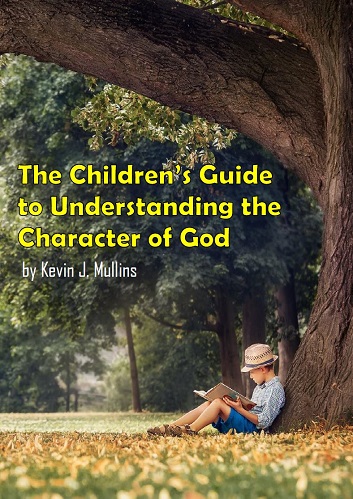(1 Corinthians 12:3) What Does it Mean to Call Jesus “Accursed”?
“Wherefore I give you to understand, that no man speaking by the Spirit of God calleth Jesus accursed: and that no man can say that Jesus is the Lord, but by the Holy Ghost.” (1 Corinthians 12:3, King James Version)
 At first glance it seems obvious that no man who is speaking by the Spirit of God would call Jesus accursed, however, when we look at what Paul is saying a little more closely, we find that he is saying something which has a deeper meaning than what we would understand today. First, let’s look at some definitions of the word accursed. Here’s the definition from Noah Webster’s 1828 dictionary:
At first glance it seems obvious that no man who is speaking by the Spirit of God would call Jesus accursed, however, when we look at what Paul is saying a little more closely, we find that he is saying something which has a deeper meaning than what we would understand today. First, let’s look at some definitions of the word accursed. Here’s the definition from Noah Webster’s 1828 dictionary:
ACCURS'ED, pp. or a.
1. Doomed to destruction or misery:
The city shall be accursed. John 6.
2. Separated from the faithful; cast out of the church; excommunicated.
I could wish myself accursed from Christ. Romans 9:13
3. Worthy of the curse; detestable; execrable [extremely bad or unpleasant].
Keep from the accursed thing. Josh 6.
Hence,
4. Wicked; malignant in the extreme.
Can you imagine a believer calling Jesus any of those things? Maybe a non-believing Jew would believe that, but Paul is writing to the Corinthian assembly made up of mostly Gentiles (and some Jews) who believe in Jesus. Why would he need to remind the believers of this most obvious point? Clearly, there must be something deeper here that we are missing.
Even today the English word accursed is mostly referred to as someone or something which is doomed, hateful, detestable etc. Here’s the word as defined in the Collins online Dictionary:

Accursedin American English
(əˈkɜːrsɪd, əˈkɜːrst)
ADJECTIVE
1. under a curse; doomed; ill-fated
2. damnable; detestable
Again, why would Paul need to educate the Christian believers in Corinth not to call Jesus any of these things? Obviously the believers in Corinth are not going around teaching people that Jesus is detestable or that He is excommunicated from the Christian church. What are we missing?
The Context
As mentioned earlier, the church in Corinth was predominantly Gentile believers who converted from paganism to Christianity. They were formerly steeped in idolatry. Notice how Paul addresses them at the beginning of his letter as translated by the King James Version:
“Now concerning spiritual gifts, brethren, I would not have you ignorant. Ye know that ye were Gentiles, carried away unto these dumb idols, even as ye were led.” (1 Corinthians 12:1, 2)
When reading this we immediately conclude that the subject of Paul’s discussion is spiritual gifts. But what we need to understand is that the word “gifts” here in the King James is in italics which means this was an added word by the translators. The word “gifts” is not in the Greek. The first sentence should read, “Now concerning spiritual brethren [or persons], I would not have you ignorant.”
So, the subject of Paul’s discussion is not spiritual gifts, but “spiritual persons” and what these “spiritual persons” are teaching is connected to what they formerly believed as idol worshipers. Therefore, in verse 3 Paul is saying that no spiritual person (one who is led by God’s Holy Spirit) will call Jesus accursed, which again is something connected to what they formerly believed as pagan idolaters.
The Original Greek Word
Let’s find out from Strong’s Concordance what the original Greek word for “accursed” is that Paul used:
Anathema: that which is laid up, i.e. a votive offeringOriginal Word: ἀνάθεμα, ατος, τό
Part of Speech: Noun, Neuter
Transliteration: anathema
Phonetic Spelling: (an-ath'-em-ah)
Definition: that which is laid up, a votive offering
Usage: a votive offering, a thing devoted to God; a curse, the thing cursed.
So, the Greek word Paul used is actually the word anathema. This can be seen in other translations as well:
American standard Version: “Wherefore I make known unto you, that no man speaking in the Spirit of God saith, Jesus is anathema; and no man can say, Jesus is Lord, but in the Holy Spirit.” (1 Corinthians 12:3)
Young's Literal Translation: “wherefore, I give you to understand that no one, in the Spirit of God speaking, saith Jesus is anathema, and no one is able to say Jesus is Lord, except in the Holy Spirit.” (1 Corinthians 12:3)
Paul is saying that anyone under the influence of God’s Spirit will not call Christ anathema. We must find out what anathema meant to Paul and the Corinthians so that we too will not be found guilty of calling Christ anathema. Anathema is defined above as “a votive offering.”
“Votives were gifts offered to the gods by their worshippers. They were often given for benefits already conferred or in anticipation of future divine favors. Or they could be offered to propitiate the gods for crimes involving blood-guilt, impiety, or the breach of religious customs. They could be given either voluntarily or in response to demands by the cult's priesthood that the donor fulfill a religious vow or honor some religious custom … Sacrifices were also thought of as gifts to the gods. They took the form of bloodless offerings such as grasses, roots, cereal grains, fruits, cheese, oil, honey, milk and incense, or were blood-offerings like wild and domesticated animals, birds and fish. The foodstuffs and liquids were either burnt on raised altars so that their aroma could rise heavenward or dropped or poured into wells, holes or tombs. What was left was usually consumed by the sacrificers.” (The Ancient Greek World)

Here's the definition of anathema in the Thayer’s Greek Dictionary:
Anathema
1. Properly, a thing set up or laid by in order to be kept; specifically a votive offering, which after being consecrated to a god was hung upon the walls or columns of his temple, or put in some other conspicuous place.
2. A thing devoted to God without hope of being redeemed, and, if an animal, to be slain (Leviticus 27:28, 29); therefore a person or thing doomed to destruction, Joshua 6:17; Joshua 7:12. A thing abominable and detestable, an accursed thing, Deuteronomy 7:26.
The original meaning of the word anathema is a votive offering which means a thing offered to a god (or to the God). Paul is saying Christ is NOT this in the sense that the Corinthian church would understand it. Christ is not a votive offering to appease the wrath of an angry God. Paul is warning them that some professed spiritual brethren are mingling their old pagan beliefs founded upon penal atonement with what Christ truly accomplished upon the cross. Earlier in chapter 10 Paul cautioned them by saying …
“But I say, that the things which the Gentiles sacrifice, they sacrifice to devils, and not to God: and I would not that ye should have fellowship with devils.” (1 Corinthians 10:20)
In Noah Webster’s 1828 Dictionary it gives two definitions of the word anathema. The first definition is the act of being excommunicated from a church. The second definition, however, is the way Paul used it in his letter to the Corinthians in connection to their former pagan idolatry:
“In heathen mythology, an offering, or present made to some deity and hung up in a temple. Whenever a person quitted his employment, he set apart, or dedicated his tools to his patron-deity. Persons who had escaped danger remarkably, or been otherwise very fortunate, testified their gratitude by some offering to their deity.”
Here is how the modern dictionary defines the word anathema:
Anathema1a: someone or something intensely disliked or loathed —usually used as a predicate nominative
… this notion was anathema to most of his countrymen. — Stephen Jay Gould
b: one that is cursed by ecclesiastical authority
2a: a ban or curse solemnly pronounced by ecclesiastical authority and accompanied by excommunication
b: the denunciation of something as accursed
c: a vigorous denunciation: CURSE
As you can see, the notion of offering to a deity is gone out of the modern dictionary and has been replaced with something or someone intensely disliked or loathed. Throughout the years Satan has been working to steer our minds away from the truth. Subtly bringing in the pagan doctrine of appeasement atonement into the “Christian” church is a work of genius in order to deceive us into believing Jesus was sent to this earth to die as an appeasing atonement to God. This dangerous doctrine self-acquits us from the verdict of murdering the Son of God to doing something that God wanted or needed to be done. We have deceived ourselves in becoming God’s accomplices instead of God’s enemies who without His Spirit are “hostile against God” (Romans 8:7) and desire Christ dead and out of the way.
Here is a modern explanation of why Christ had to die that Paul was warning us against:
“The necessity of appeasing God is something many religions have in common. In ancient pagan religions, as well as in many religions today, the idea is taught that man appeases God by offering various gifts or sacrifices. However, the Bible teaches that God Himself has provided the only means through which His wrath can be appeased and sinful man can be reconciled to Him. In the New Testament, the act of propitiation always refers to the work of God and not the sacrifices or gifts offered by man. The reason for this is that man is totally incapable of satisfying God’s justice except by spending eternity in hell. There is no service, sacrifice, or gift that man can offer that will appease the holy wrath of God or satisfy His perfect justice. The only satisfaction, or propitiation, that could be acceptable to God and that could reconcile man to Him had to be made by God. For this reason God the Son, Jesus Christ, came into the world in human flesh to be the perfect sacrifice for sin and make atonement or ‘propitiation for the sins of the people’ (Hebrews 2:17) … Jesus said, ‘I am the way, the truth, and the life. No one comes to the Father except through Me’ (John 14:6). The only way for God’s wrath against sinful man to be appeased and for us to be reconciled to God is through Jesus Christ. There is no other way … An important part of Christ’s saving work is deliverance from God’s wrath; Jesus’ propitiation on the cross is the only thing that can turn away God’s divine condemnation of sin. Those who reject Christ as their Savior and refuse to believe in Him have no hope of salvation. They can only look forward to facing the wrath of God that they have stored up for the coming day of judgment (Romans 2:5). There is no other propitiation or sacrifice that can be made for their sins.” (GotQuestions.com)
This pagan doctrine with a “Christian” twist from “spiritual” persons is what Paul was warning us about. Jesus was not “born to die” as a sacrifice to God in order for God to finally be able to forgive fallen man. Jesus did not die to save us from God's wrathful anger against us. He did not die to save us from being killed or tortured for eternity in flames by our heavenly Father. God has never condemned us. He is not, nor ever has been, an enemy towards us, but we have been enemies towards Him (Jeremiah 31:3; Romans 8:31; Hebrews 13:5). In the book of John, Jesus tells us exactly why He came:
“Pilate therefore said unto him, Art thou a king then? Jesus answered, Thou sayest that I am a king. To this end was I born, and for this cause came I into the world, that I should bear witness unto the truth. Every one that is of the truth heareth my voice.” (John 18:37)
What truth did Jesus come to bear witness to? Let’s read verse 36:
“Jesus answered, My kingdom is not of this world: if my kingdom were of this world, then would my servants fight, that I should not be delivered to the Jews: but now is my kingdom not from hence.”
 The truth that Jesus came to bear witness to is that His kingdom is a kingdom of peace and NEVER uses force or coercion as worldly kingdoms do. Jesus was not sent by God to die as an appeasing sacrifice but to bear witness to the true non-violent character of His Father which He accomplished the night before His death:
The truth that Jesus came to bear witness to is that His kingdom is a kingdom of peace and NEVER uses force or coercion as worldly kingdoms do. Jesus was not sent by God to die as an appeasing sacrifice but to bear witness to the true non-violent character of His Father which He accomplished the night before His death:
“I have glorified Thee [God, His Father] on the earth: I have finished the work which Thou gavest Me to do.” (John 17:4)
The killing of Christ upon the cross was a magnification of our enmity (hostility) against Jesus influenced by Satan and “the power of darkness” (Luke 22:53). Man did not offer up Christ as a redeeming sacrifice. Hebrews 7:27 and Hebrews 9:14 tell us that Christ offered up Himself to God. This offering up of Himself was not at the cross, but “before the foundation of the world” (1 Peter 1:20; Revelation 13:8) during “the council of peace” (Zechariah 6:13) when the Father and Son planned the everlasting covenant if man should fall.
Knowing that sin would warp our understanding of God's true character, Christ (before the foundation of the world and before sin ever reared its ugly head) gave Himself to God His Father in covenant that He would come to this earth and present His Father’s character to the fullest. In turn, God gave His only begotten Son over to us (John 3:16) and what did we do to Him? We killed Him because we didn’t like Him! His purity drew our sinfulness to the forefront. How did we get rid of the problem? Was it through love and repentance, allowing God to purge our hatred from our hearts? No. We instead yelled, “Crucify Him! Crucify Him!” We manifested the murder that was in our hearts. Christ bore all our iniquity, wrath, punishment, hatred and hostility we could dish out against Him. He bore all this by not retaliating against us but freely forgiving us (Isaiah 53:6, 7; Luke 23:34; Romans 8:7; 1 Peter 2:23).
“Put on therefore, as the elect of God, holy and beloved, bowels of mercies, kindness, humbleness of mind, meekness, longsuffering; Forbearing one another, and forgiving one another, if any man have a quarrel against any: even as Christ forgave you, so also do ye.” (Colossians 3:12, 13)
So how did heaven come to the rescue of fallen mankind? Christ, the only begotten Son, so loved the world that He offered Himself to God who so loved the world that He gave His only begotten Son, that whosoever believeth in the only begotten Son, who fully revealed the character of God to a sin-darkened world and was then killed by them, should not perish, but have everlasting life.
This is the love of God. Knowing the true character of God is what brings reconciliation between God and man. It's OUR minds and hearts that need to change toward God, not God's toward us. This is as far from anathema as the east is from the west. Christ was not offered up to God as an appeasement sacrifice by humanity to satisfy God's justice and wrath against us, but He was offered down to humanity by God to appease us and our fallen sense of justice and wrath against Him; for God has never desired a sacrifice as did the pagan deities.
“Sacrifice and offering thou didst not desire; mine ears hast thou opened: burnt offering and sin offering hast thou not required” (Psalm 40:6)
For more details of what you just read, please see the articles entitled:
You may also want to read the following books:





.jpg)


